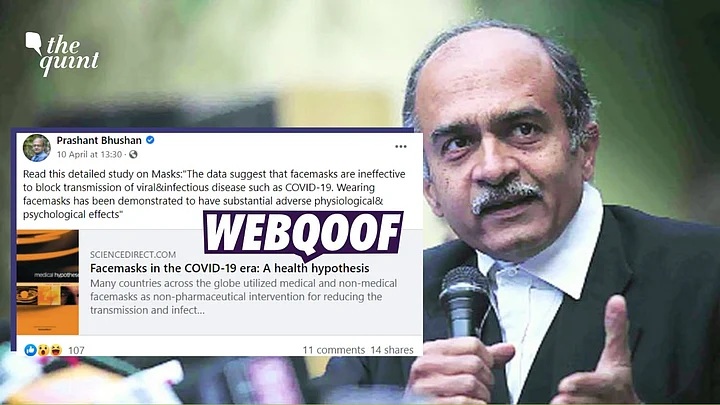Advocate Prashant Bhushan on Saturday, 10 April, posted a message on his social media handles that said that face masks are ineffective against COVID-19 based on a ‘study’ by a US-based cardiologist. The paper was also shared by other social media users with a similar claim.
Twitter removed Bhushan’s post on Sunday as it did not meet its community standards and COVID-19 guidelines, however, his post was still up on Facebook while this article was being written.
However, we found the paper was a hypothesis by one doctor and had not been reviewed nor was backed with scientific proof.
In fact, several sources cited in the paper, too, talked about the effectiveness of masks in preventing COVID-19 transmission. Moreover, health organisations around the world and several public health experts have repeatedly advised using masks to further control the spread of the virus.
CLAIM
Bhushan’s post said, “Read this detailed study on Masks: ‘The data suggest that facemasks are ineffective to block transmission of viral & infectious disease such as COVID-19. Wearing facemasks has been demonstrated to have substantial adverse physiological& psychological effects’.”
This is not the first time that he tweeted against masking, the need for lockdowns and vaccines. In a previous tweet, Bhushan claimed that “vaccines were hardly effective on the new strains of COVID-19”. Several such anti-masking and anti-vaccination posts can be seen on his timeline.
WHAT WE FOUND OUT
The paper Bhushan shared was called ‘Facemasks in the COVID-19 era: A health hypothesis’. It is not data-based research or a “detailed study” as opposed to what he claimed. The hypothesis was shared by many as a study and was first published in November 2020 to support an anti-masking narrative.
The author makes two major claims in the paper – masks restrict breathing, causing hypoxemia/hypercapnia and masks are not effective against preventing COVID-19 transmission.
CLAIM 1: MASKS RESTRICT BREATHING
This claim was previously debunked before. The Quint reached out to Dr Arvind Kumar, Founder Trustee of Lung Care Foundation, who told us that a regular three-ply mask or a surgical mask will not cause any breathing difficulty.
When masks are worn continuously for 8 hours, especially N95 or N99 masks, there is a 2-4 percent marginal increase in the carbon dioxide level. This can happen to doctors who perform surgery, who work with an extra layer of surgical mask above the N95. But if a common person uses a triple-layer mask or surgical mask, there is no such risk.Dr Arvind Kumar, Founder Trustee of Lung Care Foundation
Dr Richa Sarin, Pulmonology and Critical Care Medicine Consultant at Fortis Hospital explained that the masks regular public has been asked to wear are not air-tight or sealed. The masks prevent aerosols and virus from going in or out, but CO2 particles are much smaller in size and hence, can pass through easily.
The author in his paper refers to old guidelines published by the World Health Organisation (WHO) about wearing masks, where the organisation had advised only people with symptoms to wear a face cover since there was a shortage of masks for healthcare workers.
The organisation has since updated its guidelines and has asked everyone to wear masks to prevent transmission of the virus. Moreover, no where in the referenced paper does WHO say that masks are not effective against COVID-19.
CLAIM 2: MASKS DON’T PREVENT COVID-19 TRANSMISSION
The WHO, the US Centers for Disease Control and Prevention and the Indian Council of Medical Research (ICMR) agree that masks are generally safe to use and help to curb the spread of COVID-19.
A study published in The Lancet in January 2021 found that “communities with high reported mask-wearing and physical distancing had the highest predicted probability of transmission control”.
The author cites the size of the virus to claim that it can pass through the masks. However, the virus does not travel on its own, the aerosols that carry the virus from an infected person on to others. Most masks prevent aerosols to pass through them, thus preventing the spread of COVID-19.
If I am infected and sitting across a table from a healthy person while wearing an N95 mask, 95 percent of my aerosol stays inside the mask. Even though 5 percent escapes, its velocity is less and it falls down as it escapes the mask. It will not reach the person sitting at a distance of 1 metre. If the person in front of me is also wearing a mask then it is safer because the viral particle will stop on the surface of his mask. Surgical masks and cloth masks offer similar protection but the degree is reduced.Dr Arvind Kumar, Founder Trustee of Lung Care Foundation
The author also cites a study in his paper that said that no difference was observed in transmission of the virus with and without the mask. That study, however, has been updated several times and has mentioned that the studies conducted earlier had several limitations.
Evidently, the claims that face masks are ineffective against transmission of COVID-19 and have harmful effects are both false. Based on the research so far, masks are crucial in our fight against the virus, especially now when the country is witnessing its second wave of infections.
(Not convinced of a post or information you came across online and want it verified? Send us the details on WhatsApp at 9643651818, or e-mail it to us at webqoof@thequint.com and we'll fact-check it for you. You can also read all our fact-checked stories here.)
(At The Quint, we question everything. Play an active role in shaping our journalism by becoming a member today.)
